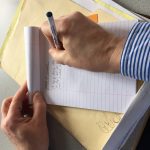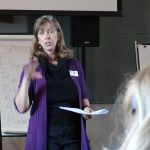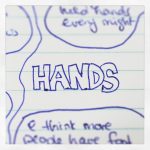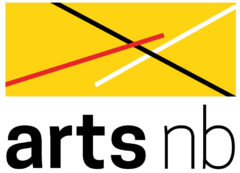Home » News » Blog » Creative Aging: Understanding Our Stories
Creative Aging: Understanding Our Stories
Creative Aging: Understanding Our Stories
Vanessa Moeller, Deputy Director
 The energy in the room was palpable on February 21st as over 40 participants gathered at St. Thomas University for the first workshop in the Creative Aging workshop series entitled Understanding Our Stories. Participants arrived to find Rhodia notebooks and pens waiting for them thanks to the generous sponsorship of our local art hub Endeavours – a special thank you to Stefan Westner, Luke Randall and the entire staff for supporting this, dare I say it, great endeavour!
The energy in the room was palpable on February 21st as over 40 participants gathered at St. Thomas University for the first workshop in the Creative Aging workshop series entitled Understanding Our Stories. Participants arrived to find Rhodia notebooks and pens waiting for them thanks to the generous sponsorship of our local art hub Endeavours – a special thank you to Stefan Westner, Luke Randall and the entire staff for supporting this, dare I say it, great endeavour!
 Taught by professional writer Deborah Carr, the workshop lead participants through a series of writing exercises to get the creative juices flowing. We began by doing an acrostic by using each letter in our name as the first letter of words we thought either described us or we wished described us. We were then asked to choose one of the words as our “name” for the day.
Taught by professional writer Deborah Carr, the workshop lead participants through a series of writing exercises to get the creative juices flowing. We began by doing an acrostic by using each letter in our name as the first letter of words we thought either described us or we wished described us. We were then asked to choose one of the words as our “name” for the day.
After getting our new names, we started a series of freewriting exercises. Deborah gave everyone a prompt such as “a place of comfort” or “hands” as jumping off points and participants were asked to write for 10 solid minutes. The key to these freewriting exercises is to keep the pen to the paper and to keep writing in a stream-of-consciousness manner for the full time allotted. Often freewriting allows the mind to loosen up to make interesting connections and unearth unexpected nuggets from the subconscious. I  must admit that I was very impressed with the connections and creativity that poured from these exercises and the spirit of generosity the participants came to the day with. It felt like a very safe, accepting space to share thoughts and experiences. A few stories were incredibly touching and the conversations I had throughout the day with the participants enriched me immeasurably.
must admit that I was very impressed with the connections and creativity that poured from these exercises and the spirit of generosity the participants came to the day with. It felt like a very safe, accepting space to share thoughts and experiences. A few stories were incredibly touching and the conversations I had throughout the day with the participants enriched me immeasurably.
After lunch, we started on more structured exercises that will lead into the subsequent workshops. One exercise included describing a character and trying to get into the character’s headspace to understand their motivations. Another asked participants to list all the roles they play in their own lives. I dare you to try this  exercise because I know when I filled a page with almost 75 different roles I have, from poet to partner, from tea-drinker to reader, I felt a bit overwhelmed and exhausted.
exercise because I know when I filled a page with almost 75 different roles I have, from poet to partner, from tea-drinker to reader, I felt a bit overwhelmed and exhausted.
By the end of the day my sense was that everyone was tired but fired up to continue. The ladies at my table were exchanging numbers so that they could call each other to prompt one another to keep writing, which I thought was brilliant. I’m sure these workshops will lead to amazing outcomes and it was a privilege to be there as a facilitator.
My thanks to Barbara Burnett and Adam Thornton at the Atlantic Institute on Aging for their support as well as Bill Randall and his amazing research crew, including two visiting Danish researchers. It was a day to remember!





